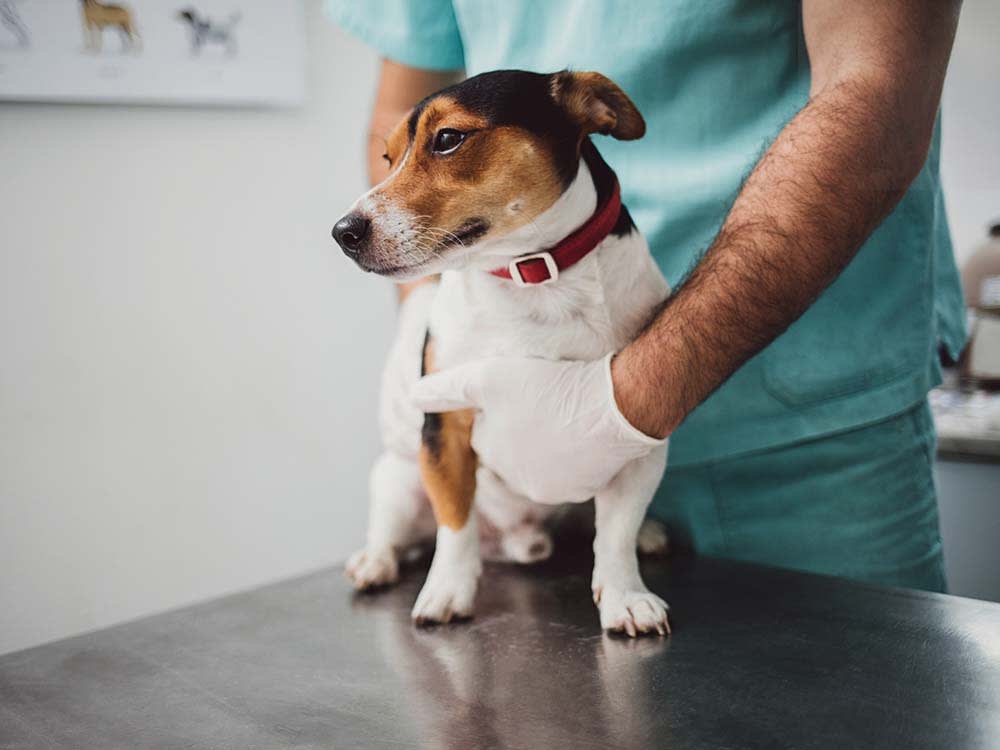My Dog Has Diarrhea. Should I Call the Vet?
Certain symptoms could mean your dog is battling a potentially fatal condition called hemorrhagic gastroenteritis (HGE). Here’s everything you need to know.
In This Article:
Why Does My Dog Have Diarrhea? Varieties of Diarrhea How Long Should Diarrhea Last in a Dog? When Should I Seek Veterinary Help for My Dog’s Diarrhea?
Diarrhea is no fun for dog parents — or their sick pups. And besides the obvious discomfort (and occasional mess), it can be cause for alarm in some cases. So, why does your dog have diarrhea? What can you do about it? And when should you seek veterinary help? Read on to learn.
Why does my dog have diarrhea?
Internet forums are full of requests for adviceopens in new tab about this issue. “My dog has diarrhea, but is otherwise acting normally”, a typical post reads. That’s because diarrhea is one of the most common health issues dogs experience. One study found opens in new tab 14.9 percent of dogs had experienced an episode of diarrhea within the previous two-week period. So, what would cause diarrhea in a dog, and what should you do if your dog has diarrhea?
Stress or anxiety
Stress can be a trigger of diarrhea in dogs — when a dog is stressed, their body releases hormonesopens in new tab like cortisol, which can have a variety of impacts on the pet’s digestive system, resulting in increased bowel movements and diarrhea. Stress over time can lead to a weakened immune system, making pets more vulnerable to gastrointestinal problems.
How much do you spend on your pet per year?
Eating toxins or poisons
When dogs ingest toxins or poisons, it will irritate their intestines, causing disruptions to nutrient absorption and triggering an immune response. These factors often lead to diarrhea. There are a variety of common toxinsopens in new tab dogs occasionally get into. Be sure to check if your dog has been exposed to any of these when determining why they are experiencing diarrhea. Immediate veterinary care is crucial if a dog has eaten any harmful substances.
Change in diet
Dogs and their digestive systems can be finicky when it comes to changes in food. Even if a dog has not consumed anything toxic, a sudden change in their diet can disrupt gut bacteria, and the digestive system can take some time to adjust to new nutrients. Gradually transitioning the dog’s diet over a week or more can help prevent these issues.
Pancreatitis
Pancreatitis — inflammation of the pancreas — can disrupt the digestive process and cause diarrhea in dogs. The pancreas is an organ that produces enzymes essential for digestion. When it’s inflamed, these enzymes can leak into the abdominal cavity, causing pain and inflammation in surrounding tissues, leading to symptoms like diarrhea. Pancreatitis can be triggered by a high-fat diet, obesity, certain medications, or underlying diseases. The condition can be diagnosed and treated by your veterinarian.
Parasites
Many parasites live in the digestive tracts of our pets and can cause diarrhea by attaching to the lining of their intestines and feeding off nutrients, leading to irritation and inflammation. One of the most common parasitesopens in new tab that cause diarrhea in dogs is giardia, a microscopic single-celled parasite that dogs can pick up by ingesting contaminated food or water. Some parasites, like hookworms and roundworms, release toxins that can further contribute to gastrointestinal issues. If your pet has parasites for an extended period of time, they can weaken dogs’ immune systems and make them more susceptible to other infections, making diarrhea worse or more frequent.
Varieties of diarrhea
How to treat your pet’s diarrhea — and whether to call the vet — has a lot to do with the kind of diarrhea they are experiencing. Take note of the diarrhea’s consistency and color, as well as your dog’s behavior, to determine how severe the situation is and what steps to take next.
My dog has bloody diarrhea
Blood in diarrhea is almost always cause for a vet visit; bloody stool in dogs can be caused by acute issues like parasites, trauma, or infections. It can also be a sign of a serious condition — hemorrhagic gastroenteritis — which you can read more about below. It’s important to consult a veterinarian to determine the exact cause and appropriate treatment.
My dog has diarrhea and vomiting
If your dog has sudden onset of watery, bloody diarrhea — especially if accompanied by vomiting — it could be hemorrhagic gastroenteritis (HGE).HGE is one of the most common emergencies she sees in dogs. HGE can be a life-threatening condition, but with prompt treatment, most dogs make a full recovery within a few days.
This condition is characterized by a shedding of the intestinal lining due to severe inflammation and is often identified by “chunks” of tissue in otherwise watery stool. HGE can cause extreme dehydration and can lead to life-threatening conditions if not treated promptly.
While the exact cause is unknown, factors such as stress, diet, and infection are believed to trigger HGE. Treatment involves aggressive fluid replacement, withholding food initially, and administering symptomatic treatments and antibiotics. With early and intensive care, most dogs recover fully within a few days and typically do not suffer long-term health issues, though some may experience recurrent episodes.
Color variations
Different color variations in your dog’s unusual stool can provide clues as to what the issue is and how to address it swiftly. Below, a brief summary:
Black or maroon: This often signifies digested blood, possibly from bleeding in the gastrointestinal tract, and warrants a visit to the vet.
Red or blood-streaked: Fresh blood in the stool can indicate bleeding in the lower digestive tract and other more severe concerns. This also indicates the need to seek professional help.
Orange: This can be due to the ingestion of certain foods (carrots, sweet potatoes, pumpkin, and other orange foods) or indicate liver or gallbladder issues. It is wise to consult a vet if your pup’s poop is orange, and you can’t trace it back to a recent food they ate.
Yellow: Yellow stool can indicate less harmful responses to food sensitivities or allergies, but if your dog’s stool is consistently yellow, consider seeing a veterinarian.
Green: May be caused by eating grass, certain foods, or issues with bile production.
White or grey: Could indicate a lack of bile, possibly due to liver issues or certain medications.
Diarrhea in a dog with no other symptoms
For a dog with diarrhea and no other symptoms, pet parents can typically wait and see if it clears up on its own. Some vets suggest withholding foodopens in new tab for 12 to 24 hours to allow the digestive tract to settle, before introducing bland foods like boiled chicken, rice, or pumpkin. If diarrhea persists for more than 24 hours or worsens, consulting a veterinarian is recommended.
My dog has diarrhea and a swollen ear
When diarrhea is accompanied by a swollen ear, it could be the result of an ear infection — which occasionally presents with accompanying gastrointestinal symptoms. Ear infections in dogs can be caused by bacteria, yeast, or parasites, and they often lead to redness, swelling, discharge, and discomfort. If your dog has a swollen ear, or is pawing at their ear and exhibiting pain, it’s important to have them examined by a veterinarian.
How long should diarrhea last in a dog?
Often, diarrhea is not cause for great concern — in fact it is “one of the most common reasons dogs visit the veterinarian,” veterinarian Gabrielle Fadl says. However, many consecutive days of untreated diarrhea can lead to discomfort from abdominal cramping, dehydration, inflammation in the gastrointestinal tract leading to blood in the stool, vomiting, and loss of appetite, she added.
“While one or two episodes of soft stools may not require any action on your part, if your pup is experiencing diarrhea for more than a couple of days, it’s probably worth intervening,” Fadl says. One important tip is the difference between acute and chronic diarrhea.
Acute diarrhea is characterized by a bout of loose stools that lasts for less than fourteen days. This relatively common issue can be caused by dietary changes, infections, or stress and usually resolves with minimal intervention. Chronic diarrhea, however, is a condition that persists for more than fourteen days and can be cause for more concern, as it can indicate conditions like inflammatory bowel disease, food sensitivities, or parasites. If your dog’s diarrhea lasts longer than fourteen days, be sure to go to the vet so your pet can undergo thorough diagnostics and plan long-term management. For both types of diarrhea, ensuring hydration and consulting a veterinarian for proper diagnosis and treatment is crucial.
If your dog’s diarrhea lasts more than a few days or is accompanied by other symptoms like vomiting, lethargy, or a loss of appetite, it’s important to consult a veterinarian for proper diagnosis and treatment. Keeping your dog hydrated and providing a bland diet can help manage symptoms in the short term.
When should I seek veterinary help for my dog’s diarrhea?
While home remedies are the first line of defense, don’t hesitate to call a vet if you suspect the condition is more serious. Symptoms that may warrant a vet visit include painful passing of stool, lethargy, or fever. As a rule of thumb, you should seek veterinary help for your dog’s diarrhea if it persists for more than 48 hours, if there is blood in the stool, or if it’s accompanied by other symptoms such as vomiting, lethargy, fever, loss of appetite, or dehydration. Also, if your dog is very young, old, or has existing health conditions, it’s important to get veterinary advice promptly, as they are more vulnerable to the effects of diarrhea.
References
Canine Journal. What to give a dog with diarrhea. Retrieved from https://www.caninejournal.com/what-to-give-a-dog-with-diarrhea/?form=MG0AV3opens in new tab.
Centers for Disease Control and Prevention. About Giardia and pets. Retrieved from https://www.cdc.gov/giardia/about/about-giardia-and-pets.htmlopens in new tab.
Cornell University College of Veterinary Medicine. Diarrhea. Retrieved from https://www.vet.cornell.edu/departments-centers-and-institutes/riney-canine-health-center/canine-health-information/diarrheaopens in new tab.
Hubbard, K., Skelly, B., McKelvie, J., & Wood, J. (2007). Risk of vomiting and diarrhoea in dogs. Veterinary Record, 161, 755-757.
Holzmann, B, et al. “Utility of Diagnostic Tests in Vomiting Dogs Presented to an Internal Medicine Emergency Service.” Frontiers in Veterinary Science, vol. 10, 2 Feb. 2023, www.ncbi.nlm.nih.gov/pmc/articles/PMC9933778/, https://doi.org/10.3389/fvets.2023.1063080opens in new tab.
Lim, S. Y., Cridge, H., Twedt, D. C., Ohta, H., Nuruki, T., & Steiner, J. M. (2024). Management of acute-onset pancreatitis in dogs: a Narrative Review. Journal of the American Veterinary Medical Association, 262(9), 1-15.
Parsons, B., Porter, C., Ryvar, R., Stavisky, J., Williams, N., Pinchbeck, G., Birtles, R., Christley, R., German, A., Radford, A., Hart, C., Gaskell, R., & Dawson, S. (2010). Prevalence of Campylobacter spp. in a cross-sectional study of dogs attending veterinary practices in the UK and risk indicators associated with shedding. The Veterinary Journal, 184, 66-70.
Pet Poison Helpline. List of toxins that are dangerous to your dog. Retrieved from https://www.petpoisonhelpline.com/pet-tips/list-of-toxins-that-are-dangerous-to-your-dog/?form=MG0AV3opens in new tab.
Preventive Vet. Your dog has diarrhea, what to do? Retrieved from https://www.preventivevet.com/dogs/your-dog-has-diarrhea-what-to-do?form=MG0AV3opens in new tab.
Veterinary Practice. Acute diarrhoea in dogs and cats: Causes and faecal analysis. Retrieved from https://www.veterinary-practice.com/article/acute-diarrhoea-in-dogs-and-cats-causes-and-faecal-analysis?form=MG0AV3opens in new tab.












